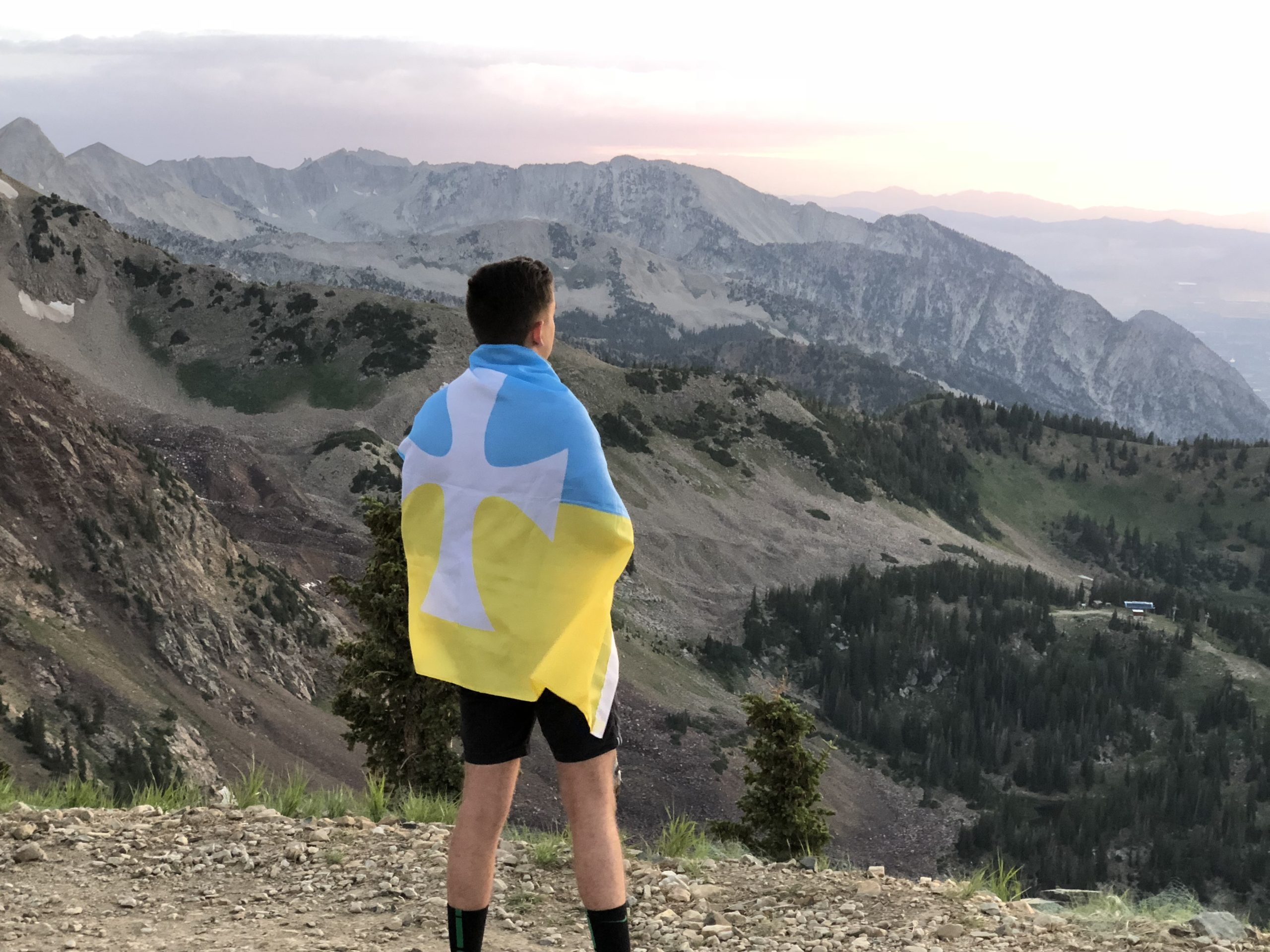
BY ASHLEY SZATALA
Shumake, NORTHERN ARIZONA 2007, details below being the first openly gay Funny Car driver in the NHRA and the leadership approaches that guide him
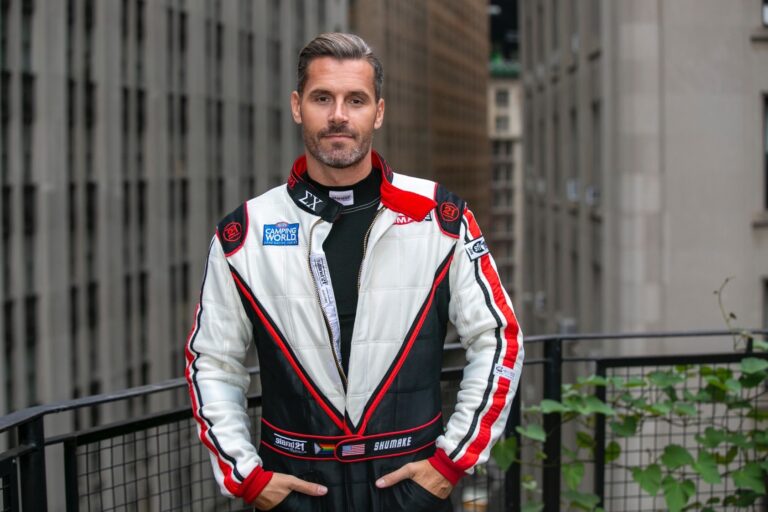
Transformational leadership is the practice by which leaders inspire and empower others to innovate and create change that will positively impact the Fraternity and ultimately the world. The transformational leader first must learn to manage self before being able to lead others and cultivate action within their community and campus.
If Travis Shumake, NORTHERN ARIZONA 2007, didn’t have courage and resiliency, his life would look a lot different. He wouldn’t have been a Sigma Chi, and he wouldn’t be the first openly gay Funny Car driver in the National Hot Rod Association. The current Sigma Chi Foundation director of development for the Northeast region recently resumed his racing dream after pausing it at age 15 upon the death of his father, Tripp Shumake, an Arizona Drag Racing Hall of Fame inductee who was a mentor to him. Today Shumake is making an impact in the sport not only for his driving record but also for the representation and visibility he brings by being an openly gay competitor. He discusses below his path to being a drag racer, the impact Sigma Chi has made on his life and what transformational leadership and putting it into practice means to him.
TELL ME A LITTLE BIT ABOUT YOUR DECISION TO PURSUE DRAG RACING AND HOW YOUR FATHER INSPIRED THIS.
My dad [Tripp Shumake] was a professional race car driver his entire life. I was in our storage unit in Arizona over Thanksgiving and found a paper he wrote in seventh grade about wanting to be Arizona’s first professional drag racer in 1956. And he did it. That’s what he did with his life. He was effectively the first Arizonan in the drag racing hall of fame.
I grew up around the sport with him. We raced go-karts competitively together as kind of our connection and as a way to introduce me to driving. In drag racing, you go straight really fast. So we raced go-karts so I could have other skills, such as learning what to do when something goes wrong because you don’t really learn much just going straight. Sadly, when I was 15, my dad was killed in a highway accident. So, kind of stops that [drag racing] dream, right?
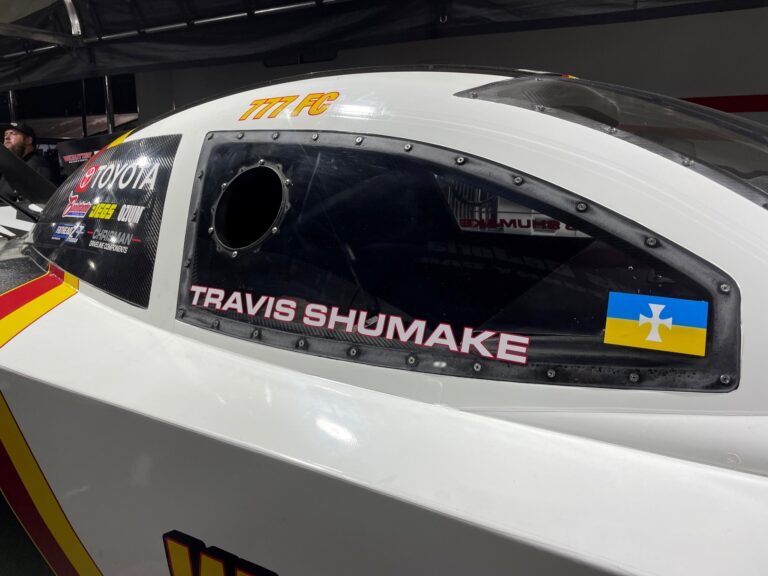
Same as with my father, I wrote every paper about being a race car driver when I grow up. Right around the time my father passed away, I was realizing I was gay. So his passing was kind of an easy out for me to not have to deal with that. I literally went from being a race car driver to being a competitive cheerleader. I kind of let go of that dream and for 20 years went to the races, enjoyed watching them and was just always the guest of other drivers as Tripp’s kid. I’d come to the races and have this fun experience, but I never thought more about it.
And then in March [2021] I was at a race in Florida and was hearing stories about my dad I had never heard from other drivers. I realized that by staying more around this community I was going to connect with my dad’s story and hear more about him. We also were talking about the social dynamics of drag racing and how it’s a 60-40 conservative-liberal community, but it doesn’t look that way.
I made a joke at this dinner like, “Or I can just come be the first gay race car driver and finish that childhood dream.” And the restaurant went silent. A race team owner, a sportscaster from Fox Sports and everyone [at dinner] was like, “Yeah, this is totally viable. Here’s how this could work.” We kind of put some pen to paper, and that was now seven months ago. So, my dad’s influence has always been there. I just thought that chapter was closed.
"I realized that by staying more around this community I was going to connect with my dad's story and hear more about him."
~Travis Shumake, NORTHERN ARIZONA 2007
Drag races work as a 16-car bracket, like March Madness. It starts in the morning with 16 cars, and by the end of the day there’s two. And my family would never watch the final race because my dad didn’t do traffic. And that weekend I’m like, “I’m not following that rule. I’m on vacation in Florida.” So I watched the race, and I was stuck in two hours of traffic getting out of the racetrack. [While stuck in traffic] this Miranda Lambert song came on, “The House That Built Me,” and I just started bawling in the car. I’m like, “I’m going to be a race car driver .” The only reason I heard that song was because I was stuck in traffic. I was like, “We’re doing this, Dad.”
FOR THE UNINITIATED, WHAT IS DRAG RACING?
Drag racing is a quarter-mile racetrack with two side-by-side vehicles. The first one to the finish line wins. In this sport I drive an 11,000 horsepower, short wheelbase race car where the engine kind of sits in my lap. It goes up to about 330 miles an hour with big parachutes out the back. It’s the fastest accelerating vehicle on the planet. My personal top speed is 319 miles an hour, and I covered the full length of the racetrack in 3.9 seconds.
I recently had a pretty bad crash. It’s a very dangerous sport. On my race car I have the [Sigma Chi] flag and the Foundation sticker. [The crash] blew them up. I was looking at the wreckage and I’m like, [expletive], it peeled off the flag. So that’s a little bit about drag racing.
WHY ARE REPRESENTATION AND VISIBILITY SO IMPORTANT, ESPECIALLY IN THIS SPORT?
As someone who grew up loving the sport of drag racing, the collectibles I would buy and the posters I put on my wall were all female race car drivers because they were the closest thing that I saw that was different. So all my favorite race car drivers as a kid were female just because there was no one like me in this sport. And I think that’s so important [to have yourself reflected in something]. Not that I want people to have my poster on the wall, but I want people to know that I found a way into something that I love.
I have not yet competed at a national event, but I go to them as a rising driver. I’ve signed autographs and people yell at me in the stands. And they say thank you because, “Me and my husband are gay, we’ve been going to the races forever, and it’s so great to see someone finally out on the track,” or “I have a gay son, and he is so excited to come to the races with me next year because you’re going to be at the track.” I’m opening up comfort and access to the sport. It’s America’s first motor sport. Drag racing came around before NASCAR. To be able to just open up the door, and not only for drag racing but all motorsports, it’s like, let’s break down this final barrier.
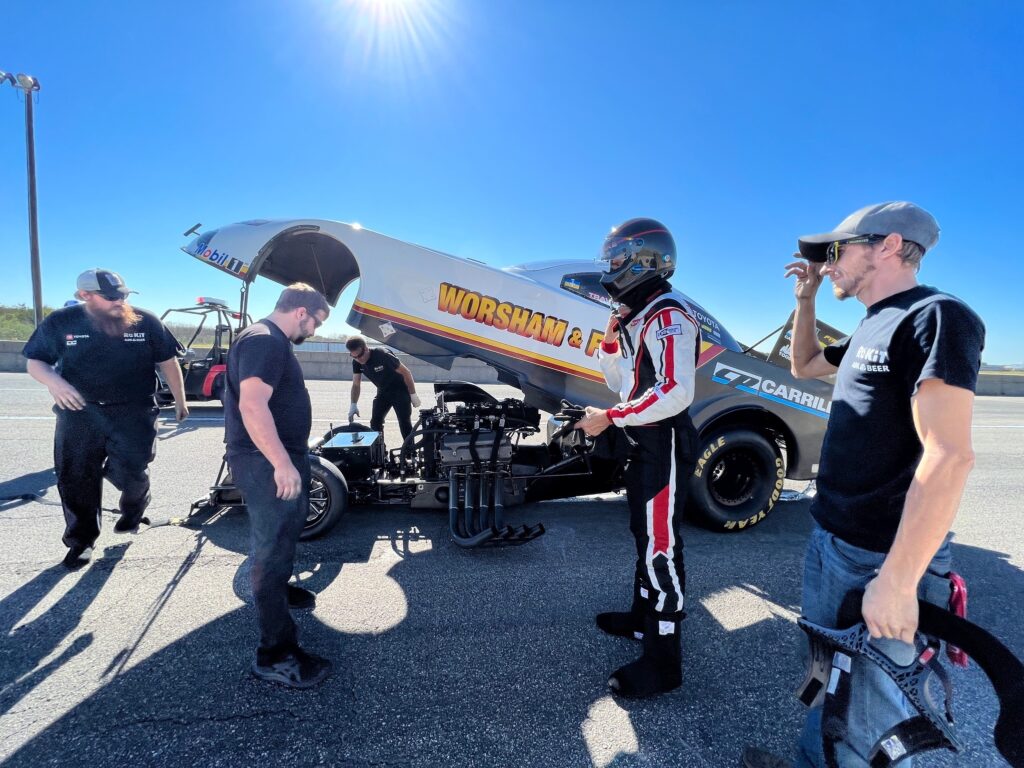
And candidly, I am aware of my privilege. I’m a handsome, second-generation, business-minded person. I am able to leverage that to be successful in this sport. So, I don’t know that it is as big of an uphill battle as people think because I’m Tripp’s kid, and people aren’t really giving me a hard time for being gay because they respect my dad so much. I’m playing that card appropriately to try to advance this mission. That’s why I felt like it was my obligation when that conversation in Florida happened. It was like, I would be a jerk if I didn’t do this. I want to do this. I have the resources to do this. We can play up the dad thing, the gay thing, to find money. I can’t just sit here. We’ve got to go.
IN 2005 YOU WERE PHOTOGRAPHED IN A SIGMA CHI SHIRT FOR AN ARTICLE IN THE ADVOCATE MAGAZINE ON BEING A YOUNG GAY LEADER WHO’S ONE TO WATCH FOR MAKING A DIFFERENCE. WHAT WAS YOUR UNDERGRADUATE EXPERIENCE WITH SIGMA CHI LIKE, AND HOW DID IT PREPARE YOU FOR THE ADVOCACY YOU’RE KNOWN FOR AND ADVERSITY YOU’VE FACED?
Sigma Chi was the first adversity I feel like I faced as a young man. I’m a legacy [through my stepfather Jim Anderson, MISSOURI-COLUMBIA 1966], and I didn’t get a bid because I was gay. It was the first time I faced a challenge beyond my father’s passing, that something in my life wasn’t handed to me on a platter. I was like, I’m already freshman class president of my university, I’m on a cheerleading scholarship, I’m a legacy. And I brought like 10 of my friends to be Sigma Chis. Everyone got a bid but me.
At that particular time the Northern Arizona chapter had a 100 percent “yes” vote [requirement in order for potential new members to receive a bid to join the chapter]. And a fifth-year senior came back to vote night and was like, “No, I don’t want a gay [person in the chapter].” So the next morning after everyone got their bids, a brother called me and said, “Do not walk down to get your bid. Let’s meet for lunch in an hour. You’re not getting a bid. Let’s not make you feel terrible.”
So we met in the student union and had lunch, and they explained what happened and asked if I would consider [going through recruitment again] the next semester. [They said,] “One we’re going to change the voting rules, and two would you consider it after what we put you through?” And I said, “No, I’m going to be a [Phi Delta Theta], go [expletive] yourselves.” So I pledged Phi Delt for like a whopping three weeks. And then I waited almost a year and a half and rushed and joined Sigma Chi. It was one of the best things that happened to both myself and our chapter.
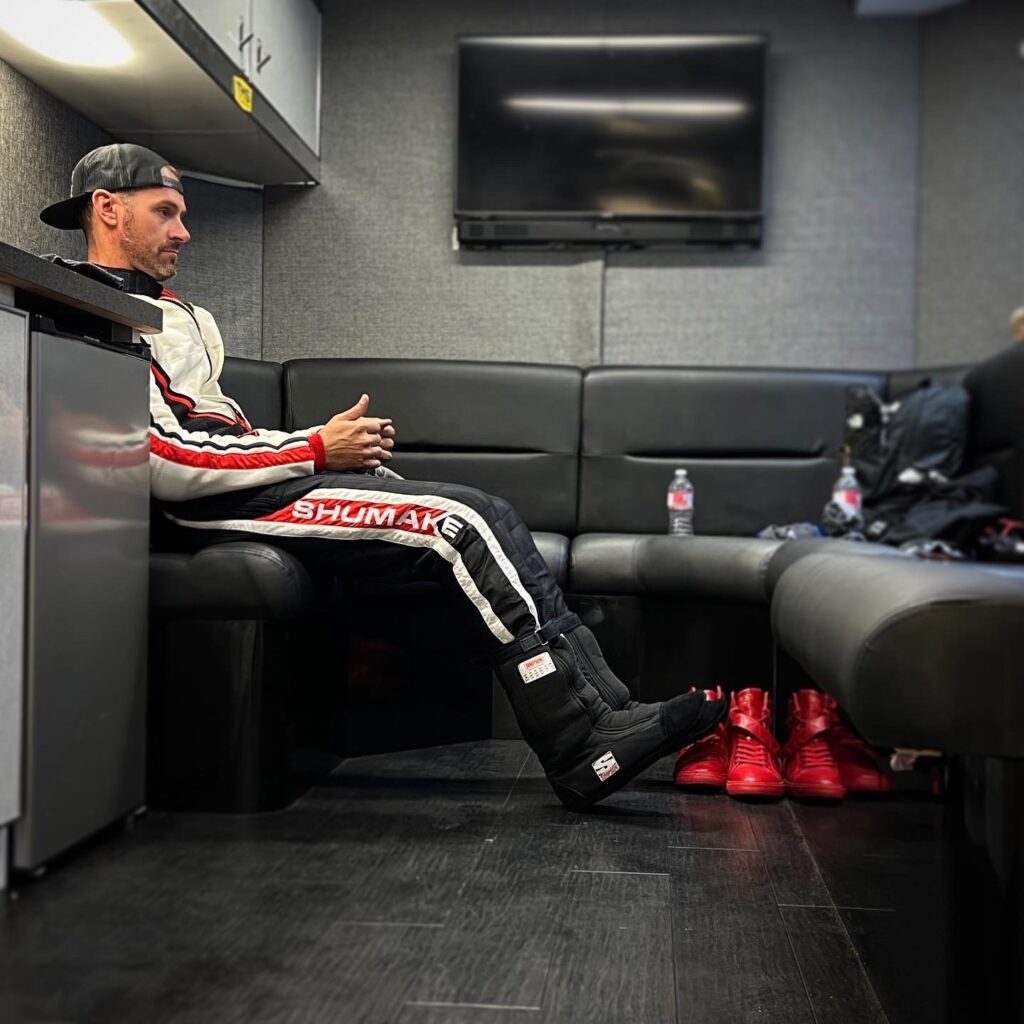
Change takes time. One of my closest friends who’s my biggest supporter, he’s the fifth-year senior who voted against me. The first person to write, “Go Travis, this is so fun to watch your drag racing career,” is the brother who was the one who started this.
Because of that, there was an article that came out because of a book. My [resident assistant] gave me a book about being gay in fraternities. And on the last page it was like, “We’re writing another book. Submit your story.” Like, this is so 2005: I mailed my story. And then I became a published author because of that. Then it’s just crazy how it propelled me.
Two years later I was on the cover of the magazine as [one of] the future gay leaders of America. I ended up being student body president of my school. And it all came from such a negative experience that we as a chapter grew from. It could have been really bad. And then it turned out to be something good. It gave me public speaking opportunities, and it kind of shaped who I was as a leader and as a person.
I’ve been on [the Krach Transformational Leaders Workshop] faculty now for 12 years, and it used to be a keynote speech. I would give the story, and now it’s a non-starter. I love watching the progress of our Fraternity and society. That “Hey, it’s OK to be gay speech” is no longer relevant at Sigma Chi.
IT SEEMS LIKE YOU HAVE HAD LEADERSHIP QUALITIES SINCE YOU WERE YOUNG. IS THERE A PARTICULAR INSTANCE THAT MOTIVATED YOU TO BE A LEADER AMONG YOUR PEERS?
I’ve always felt my drive to be in a leadership role as a child was to overcompensate for being gay. I’ve always thought you can’t not like me if I’m the president. I have been saying that since I was president. I started being president in the fifth grade all the way through my fifth year of college. It was kind of a defense mechanism. I’ve unwrapped that through therapy. And also, when there’s a need to step up to the plate, as a kid I always felt like, oh, I can stay after school and reset the lunch tables after the rally. Like sure, I can do that.
So, I desire to give back, volunteer and to be socially accepted. That kind of drove me to seek those leadership roles. The [return on investment] is much different. You maybe do it for those reasons, but then you learn that I’m a better organizer than I am a doer. I’m a better project manager than I am an executer. Yeah, I don’t maybe always have the best ideas, but I can deliver the message.
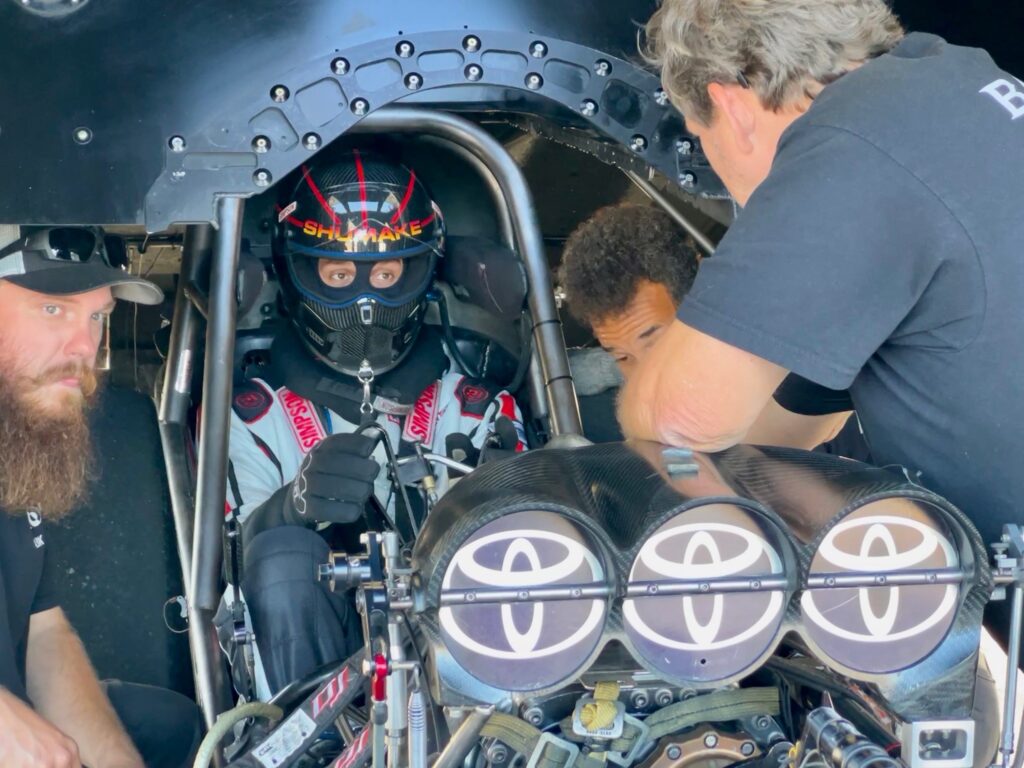
YOU CHOOSE TO VOLUNTEER YOUR TIME AS A FACILITATOR AT SIGMA CHI’S KRACH TRANSFORMATIONAL LEADERS WORKSHOP [TLW] AND ITS OFFICER TRAINING ACADEMY [OTA]. WHY DO YOU FEEL IT IS IMPORTANT TO GIVE BACK TO SIGMA CHI BY MENTORING UNDERGRADUATES?
Whether good or bad, Sigma Chi has provided me so many opportunities that have shaped my life and continue to shape my life. Being around my brothers and these different roles as a volunteer allows me to shape others while staying connected to the fraternal bonds I craved when I rushed. I love interrupting people and saying, “Hey, I was not in a fraternity. I am in a fraternity.” Or when someone says, “I was a [Chi Omega] or I was a [Kappa Sigma],” I say, “You are.” It’s a lifelong commitment. And it continues to give back to me.
So as selfish as it sounds, I get to hang out with a hundred on my favorite Fraternity brothers who are of all ranges of age every summer in Bowling Green, [Ohio]. I get the opportunity to influence younger brothers’ lives. And then I get to, in return, go on a cool vacation once a year. I think it’s just such a reciprocal opportunity.
Six years after I was Pro Consul [in college] I disappeared from Sigma Chi. And then there was a Sigma Chi conference at the hotel I worked at. I ran into [now Associate Executive Director and Order of Constantine Sig] Bill Scott, ARIZONA 1980, in the lobby, and after a six-year break I got right back in it, and that’s been the same now for 14 years. The two-sided [return on investment] is that you make an impact, and you continue your connection with the Fraternity. I’ve had an active couple of years through OTA. I co-led the Pro Consul faculty. I did not make it to [Krach] TLW this year, which would have been my 12th year. Then I did my Horizons [Huntsman Leadership Summit] guide training this summer. So next year will be my first summer on the mountain.
Because of my long history being very openly gay and that being considered a key diversity metric in our Fraternity, I’ve always been in leadership roles in the Fraternity around diversity. Coming into these last two years as our Fraternity continues to prioritize diversity and inclusion, I’m no longer involved in those conversations. We’ve transitioned to a different level of diversity where an affluent white man is not considered diverse. I’m not sitting on these committees because we have really, truly embraced diversity and what that means, whether that’s socioeconomics, religion, race, [sexual] orientation. But I no longer hold that seat because that’s no longer a valid seat.
And I love that that’s what it’s evolved to. We’re going to take the African American, transgender, homeless brother over you. I’m like, yes, you can have my seat! It’s the evolution of our Fraternity. My voice is no longer needed. We are so much more diverse than me.
WHAT’S NEXT FOR YOU?
My goal is to race full-time. I’m on the precipice. February 2022 will start my first full season of racing. Obviously I need money, so I’m working on sponsorships. But yeah, my goal moving forward is to be a full-time race car driver and enjoy all of my Sigma Chi activities.
The best part about being a fundraiser is that it’s a flexible schedule. Both of my jobs are fundraising, right? I have to find $3 million a year for Sigma Chi, and I have to find $3 million a year to run the race car. Every other call is a different call. I’m like, which hat is this, race car hat or Sigma Chi hat? If I can make the racing thing happen, then I’ll have the coolest life in the world as a professional race car driver on the weekends and working for the Sigma Chi Foundation Monday through Friday. It just doesn’t get any better than that.
WHO DO YOU LOOK UP TO FOR INSPIRATION OR MENTORSHIP?
Brother [and Order of Constantine Sig] Cory Rigler, MONTANA 1998, is one of my mentors within the Fraternity. He led the Emerging Leaders faculty, which used to be a track at [Krach] TLW. So my first year on faculty, Cory Rigler was my lead, and [today] we talk regularly. He has been a great mentor as I go through all of this. Same with Ryan Wakefield, MONTANA and EMBRY-RIDDLE (DAYTONA BEACH) 2000.
So, two Fraternity brothers – totally different generations, they didn’t go to my school – who I met through Sigma Chi who keep my life focused. I love to have these two be my sounding board, my voices of reason.
"I am fortunate to be in the volunteer roles I am in at Sigma Chi because it gives me the best leadership training you can get. To be a facilitator of this curriculum continues to help me grow. You learn it once, and it's amazing. But teaching it, it makes you even stronger at anything you do."
~Travis Shumake, NORTHERN ARIZONA 2007
WHAT ARE IMPORTANT ATTRIBUTES OF A SUCCESSFUL LEADER, AND HOW DO YOU CONTINUE TO GROW AND DEVELOP AS A LEADER?
I think the best trait in a leader is two phrases. First, people support what they help create. It’s my go-to line. You’ve got to get buy-in and getting people to get their input and get them on your same page. And then [second is] writing stuff down. [I have a] daily to-do book. Ryan Wakefield made it for me. And I write down every day in the top right corner the date and what I’m doing that day. I have found it to be so successful. You hold yourself accountable. It’s like, here’s my three main goals for the day, and you really get them done if you just write them down.
I am fortunate to be in the volunteer roles I am in at Sigma Chi because it gives me the best leadership training you can get. To be a facilitator of this curriculum continues to help me grow. You learn it once, and it’s amazing. But teaching it, it makes you even stronger at anything you do.
To be on the other side of this [Sigma Chi Leadership Institute] curriculum in so many different ways, from Officer Training Academy to Horizons and [Krach] TLW, I feel like I’m on leadership steroids. I wish as an undergraduate I had these opportunities, and I hope undergraduates take them as what a serious, cool opportunity they are because I’m on the fast track to being a great leader at 37 because I’m teaching it for Sigma Chi.
WHAT ADVICE DO YOU HAVE FOR WAYS PEOPLE CAN INSPIRE AND EMPOWER OTHERS TO CREATE CHANGE AROUND THEM?
You being authentically you. No matter the scale, the impact is just as important. Impact is really person by person. I find that the impact I have had on a group of five during an officer training is just as big as the impact I’m having on a sport with 30 million fans. And I value them equally.
WHAT DOES TRANSFORMATIONAL LEADERSHIP AND PUTTING IT INTO PRACTICE MEAN TO YOU?
I’m on a leadership continuum, right? This journey is never going to end for me. There is no badge on LinkedIn, credential or credit I’m going to get that will [signify] the end of my leadership journey. [It’s about] having the knowledge and understanding, as a transformational leader, that I’m always going to continue to grow and learn, that I’m on a never-ending road. Once you wrap your head around that, it’s so much easier because you’re not looking for an end game – you’re looking to continue to evolve.
Transformational leadership is the practice by which leaders inspire and empower others to innovate and create change that will positively impact the Fraternity and ultimately the world. The transformational leader first must learn to manage self before being able to lead others and cultivate action within their community and campus. This quarterly series highlights members who are putting transformational leadership into practice. For more information about Sigma Chi’s Transformational Leader program, visit sigmachi.org/transformational-leader.
